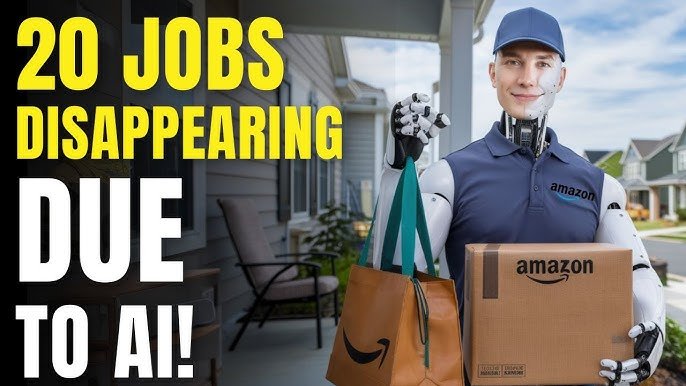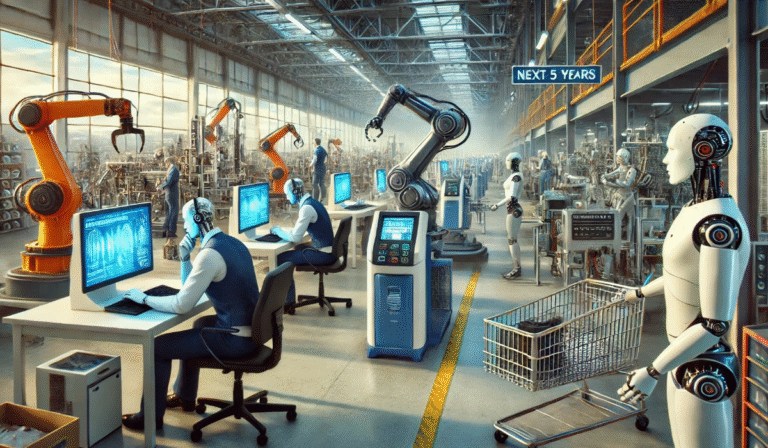What Jobs Will Disappear in the Next 10 Years? A Look at the Future of Work
As technology advances at an unprecedented pace, particularly with the rise of artificial intelligence (AI), automation, and digital transformation, the job market is undergoing a seismic shift.
Some jobs are becoming obsolete, while others are emerging to meet new demands. In this article, we’ll explore what jobs will disappear in the next 10 years, highlight jobs that will never disappear, and provide insights into jobs that will exist in the future.
This guide also touches on predictions for jobs that will disappear by 2025, 2030, and 2050, with a focus on AI’s impact.

Jobs That Will Disappear in the Next 10 Years (by 2035)
The next decade will see significant disruption in various industries due to AI, robotics, and changing consumer behaviors. Here are 10 jobs that will likely disappear by 2030 or shortly after:
- Cashiers
Self-checkout systems, mobile payment apps, and cashier-less stores (like Amazon Go) are reducing the need for human cashiers. By 2035, most retail transactions will be fully automated. - Telemarketers
AI-powered chatbots and automated marketing systems are replacing telemarketers, offering personalized customer interactions at a lower cost. - Data Entry Clerks
Optical character recognition (OCR) and AI-driven data processing tools are automating repetitive data entry tasks, making this role nearly obsolete. - Postal Service Workers
With the decline in physical mail and the rise of drones and automated sorting systems, traditional postal jobs are diminishing. - Assembly Line Workers
Advanced robotics and AI are automating manufacturing processes, reducing the need for human workers in repetitive assembly tasks. - Travel Agents
Online booking platforms and AI-driven travel planners are making traditional travel agents less necessary for booking flights and accommodations. - Bank Tellers
Mobile banking, ATMs, and AI chatbots are reducing the demand for in-person banking services. - Print Journalists
The shift to digital media and AI-generated content is decreasing the need for traditional print journalists. - Librarians
Digital libraries and AI-powered search tools are reducing the need for traditional library staff, though some roles may evolve into digital curation. - Fast Food Workers
Automated kiosks, robotic food prep systems, and delivery apps are streamlining fast food operations, minimizing human involvement.
Jobs That Will Disappear by 2025
Some jobs are already on the brink of extinction due to rapid technological adoption. By 2025, expect these roles to significantly decline:
- Video Store Clerks: With streaming services like Netflix dominating, physical video rental stores are virtually extinct.
- Parking Attendants: Automated parking systems and smart city infrastructure are reducing the need for human attendants.
- Toll Booth Operators: Electronic toll collection systems like E-ZPass are replacing manual toll collection.
Jobs That Will Disappear by 2030
By 2030, the impact of AI and automation will deepen. In addition to the jobs listed above, expect these roles to fade:
- Basic Customer Service Representatives: AI chatbots and virtual assistants will handle most routine customer inquiries.
- Insurance Underwriters: AI algorithms are automating risk assessments and underwriting processes.
- Warehouse Stockers: Autonomous robots and inventory management systems are taking over warehouse operations.
Jobs That Will Disappear by 2050
Looking further ahead, entire industries may transform by 2050, leading to the disappearance of these roles:
- Truck Drivers: Autonomous vehicles and drone delivery systems will reduce the need for human drivers.
- Routine Medical Technicians: AI diagnostics and robotic surgery will automate many technical medical tasks.
- Accountants (Basic Roles): AI-powered accounting software will handle routine bookkeeping and tax preparation.
- Retail Salespeople: Virtual reality shopping and AI assistants will replace many in-store sales roles.
What Jobs Will Disappear in the Future Because of AI?
AI is a key driver of job displacement. Roles involving repetitive tasks, predictable decision-making, or data processing are most at risk. Examples include:
- Routine Administrative Assistants: AI scheduling tools and virtual assistants are automating administrative tasks.
- Legal Researchers: AI platforms like ROSS Intelligence are streamlining legal research, reducing the need for paralegals.
- Content Writers (Low-Skill): AI tools like Grok can generate basic content, though human creativity will remain valuable for nuanced writing.
However, AI will also create new opportunities, such as roles in AI ethics, machine learning engineering, and data science.
25 Jobs That Will Never Disappear
While some jobs will vanish, others are resilient due to their reliance on human creativity, empathy, or complex problem-solving. Here are 25 jobs that will never disappear (or are likely to persist):
- Teachers (especially in specialized fields)
- Doctors and Surgeons
- Nurses
- Psychologists and Therapists
- Software Developers
- Data Scientists
- AI Ethicists
- Cybersecurity Experts
- Electricians
- Plumbers
- Construction Workers
- Chefs (high-end, creative roles)
- Artists and Designers
- Musicians
- Writers (creative, high-skill)
- Lawyers (strategic roles)
- Scientists
- Engineers (various disciplines)
- Social Workers
- Childcare Workers
- Veterinarians
- Dentists
- Fitness Trainers
- Event Planners
- Entrepreneurs
These roles require human judgment, emotional intelligence, or hands-on skills that are difficult to automate.
Jobs That Will Exist in the Future
As old jobs disappear, new ones will emerge to meet the needs of a tech-driven world. Here are some jobs that will exist in the future:
- AI Trainers: Professionals who teach AI systems to improve their performance.
- Urban Farming Specialists: Experts in sustainable, vertical farming for growing city populations.
- Space Tourism Guides: With space travel becoming commercialized, guides will assist tourists in space.
- Digital Privacy Consultants: Specialists helping individuals and companies protect their data.
- Climate Change Mitigation Experts: Roles focused on combating environmental challenges.
- Virtual Reality Content Creators: Designers of immersive VR experiences for entertainment and education.
- Robot Maintenance Technicians: Workers who repair and maintain autonomous systems.
How to Prepare for the Future Job Market
To stay relevant in a rapidly changing job landscape:
- Upskill Regularly: Learn skills in AI, coding, or data analysis through online platforms like Coursera or Udemy.
- Focus on Soft Skills: Emotional intelligence, creativity, and adaptability are harder to automate.
- Explore Emerging Fields: Consider careers in renewable energy, biotechnology, or cybersecurity.
- Network: Build connections in industries that are growing, such as tech or healthcare.
- Stay Informed: Follow trends in AI and automation to anticipate changes in your field.
Conclusion
The next 10 years will bring both challenges and opportunities to the job market. While jobs like cashiers, telemarketers, and data entry clerks may disappear due to AI and automation, roles requiring creativity, empathy, and complex problem-solving will endure. By staying adaptable and investing in skills for the future, you can thrive in the evolving world of work.
Ready to future-proof your career? Start exploring emerging fields and upskilling today to stay ahead of the curve.
Keywords: what job will disappear in the next 10 years, jobs that will disappear by 2030, jobs that will never disappear, jobs that will exist in the future, AI job displacement, future of work, automation impact on jobs.

